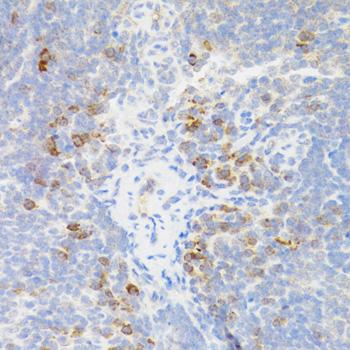Immunology Antibodies 2
Anti-TNFRSF13B Antibody (CAB5658)
- SKU:
- CAB5658
- Product Type:
- Antibody
- Reactivity:
- Mouse
- Host Species:
- Rabbit
- Isotype:
- IgG
- Antibody Type:
- Polyclonal Antibody
- Research Area:
- Immunology
Description
| Antibody Name: | Anti-TNFRSF13B Antibody |
| Antibody SKU: | CAB5658 |
| Antibody Size: | 20uL, 50uL, 100uL |
| Application: | WB IHC |
| Reactivity: | Mouse |
| Host Species: | Rabbit |
| Immunogen: | Recombinant fusion protein containing a sequence corresponding to amino acids 184-293 of human TNFRSF13B (NP_036584.1). |
| Application: | WB IHC |
| Recommended Dilution: | WB 1:500 - 1:2000 IHC 1:50 - 1:200 |
| Reactivity: | Mouse |
| Positive Samples: |
| Immunogen: | Recombinant fusion protein containing a sequence corresponding to amino acids 184-293 of human TNFRSF13B (NP_036584.1). |
| Purification Method: | Affinity purification |
| Storage Buffer: | Store at -20'C. Avoid freeze / thaw cycles. Buffer: PBS with 0.02% sodium azide, 50% glycerol, pH7.3. |
| Isotype: | IgG |
| Sequence: | CFLK KRGD PCSC QPRS RPRQ SPAK SSQD HAME AGSP VSTS PEPV ETCS FCFP ECRA PTQE SAVT PGTP DPTC AGRW GCHT RTTV LQPC PHIP DSGL GIVC VPAQ EGGP GA |
| Gene ID: | 23495 |
| Uniprot: | O14836 |
| Cellular Location: | Membrane, Single-pass type III membrane protein |
| Calculated MW: | 19kDa/26kDa/31kDa |
| Observed MW: | Refer to figures |
| Synonyms: | TNFRSF13B, CD267, CVID, CVID2, IGAD2, RYZN, TACI, TNFRSF14B |
| Background: | The protein encoded by this gene is a lymphocyte-specific member of the tumor necrosis factor (TNF) receptor superfamily. It interacts with calcium-modulator and cyclophilin ligand (CAML). The protein induces activation of the transcription factors NFAT, AP1, and NF-kappa-B and plays a crucial role in humoral immunity by interacting with a TNF ligand. This gene is located within the Smith-Magenis syndrome region on chromosome 17. |
| UniProt Protein Function: | TNFRSF13B: Receptor for TNFSF13/APRIL and TNFSF13B/TALL1/BAFF/BLYS that binds both ligands with similar high affinity. Mediates calcineurin-dependent activation of NF-AT, as well as activation of NF-kappa-B and AP-1. Involved in the stimulation of B- and T- cell function and the regulation of humoral immunity. Defects in TNFRSF13B are the cause of immunodeficiency common variable type 2 (CVID2). CVID2 is a primary immunodeficiency characterized by antibody deficiency, hypogammaglobulinemia, recurrent bacterial infections and an inability to mount an antibody response to antigen. The defect results from a failure of B-cell differentiation and impaired secretion of immunoglobulins; the numbers of circulating B-cells is usually in the normal range, but can be low. Defects in TNFRSF13B are a cause of immunoglobulin A deficiency 2 (IGAD2). Selective deficiency of immunoglobulin A (IGAD) is the most common form of primary immunodeficiency, with an incidence of approximately 1 in 600 individuals in the western world. Individuals with symptomatic IGAD often have deficiency of IgG subclasses or decreased antibody response to carbohydrate antigens such as pneumococcal polysaccharide vaccine. Individuals with IGAD also suffer from recurrent sinopulmonary and gastrointestinal infections and have an increased incidence of autoimmune disorders and of lymphoid and non-lymphoid malignancies. In vitro studies have suggested that some individuals with IGAD have impaired isotype class switching to IgA and others may have a post-switch defect. IGAD and CVID have been known to coexist in families. Some individuals initially present with IGAD1 and then develop CVID. These observations suggest that some cases of IGAD and CVID may have a common etiology. 2 isoforms of the human protein are produced by alternative splicing. |
| UniProt Protein Details: | Protein type:Cell cycle regulation; Membrane protein, integral; Receptor, misc. Chromosomal Location of Human Ortholog: 17p11.2 Cellular Component: integral to plasma membrane; external side of plasma membrane Molecular Function:protein binding; receptor activity Biological Process: cell surface receptor linked signal transduction; B cell homeostasis; hemopoietic progenitor cell differentiation; negative regulation of B cell proliferation Disease: Immunodeficiency, Common Variable, 2; Immunoglobulin A Deficiency 2 |
| NCBI Summary: | The protein encoded by this gene is a lymphocyte-specific member of the tumor necrosis factor (TNF) receptor superfamily. It interacts with calcium-modulator and cyclophilin ligand (CAML). The protein induces activation of the transcription factors NFAT, AP1, and NF-kappa-B and plays a crucial role in humoral immunity by interacting with a TNF ligand. This gene is located within the Smith-Magenis syndrome region on chromosome 17. [provided by RefSeq, Jul 2008] |
| UniProt Code: | O14836 |
| NCBI GenInfo Identifier: | 21264086 |
| NCBI Gene ID: | 23495 |
| NCBI Accession: | O14836.1 |
| UniProt Secondary Accession: | O14836,Q32LX4, Q7Z6F5, B2R8B0, B7Z6V8, |
| UniProt Related Accession: | O14836 |
| Molecular Weight: | 19,865 Da |
| NCBI Full Name: | Tumor necrosis factor receptor superfamily member 13B |
| NCBI Synonym Full Names: | tumor necrosis factor receptor superfamily, member 13B |
| NCBI Official Symbol: | TNFRSF13B |
| NCBI Official Synonym Symbols: | CVID; RYZN; TACI; CD267; CVID2; IGAD2; TNFRSF14B |
| NCBI Protein Information: | tumor necrosis factor receptor superfamily member 13B; tumor necrosis factor receptor 13B; transmembrane activator and CAML interactor |
| UniProt Protein Name: | Tumor necrosis factor receptor superfamily member 13B |
| UniProt Synonym Protein Names: | Transmembrane activator and CAML interactor; CD_antigen: CD267 |
| UniProt Gene Name: | TNFRSF13B |
| UniProt Entry Name: | TR13B_HUMAN |
 | Immunohistochemistry of paraffin-embedded mouse spleen using TNFRSF13B antibody (CAB5658) at dilution of 1:100 (40x lens). |
View AllClose






